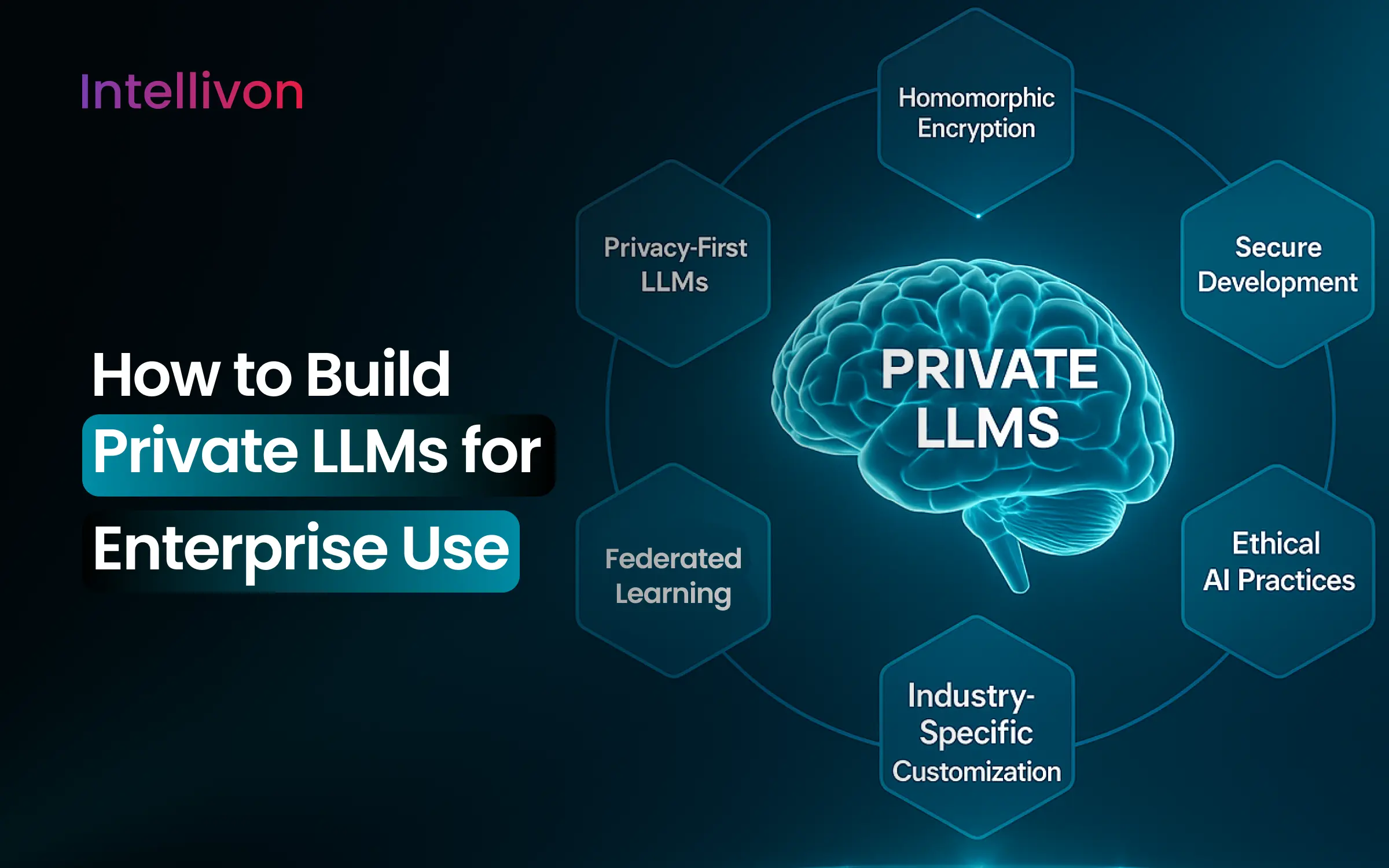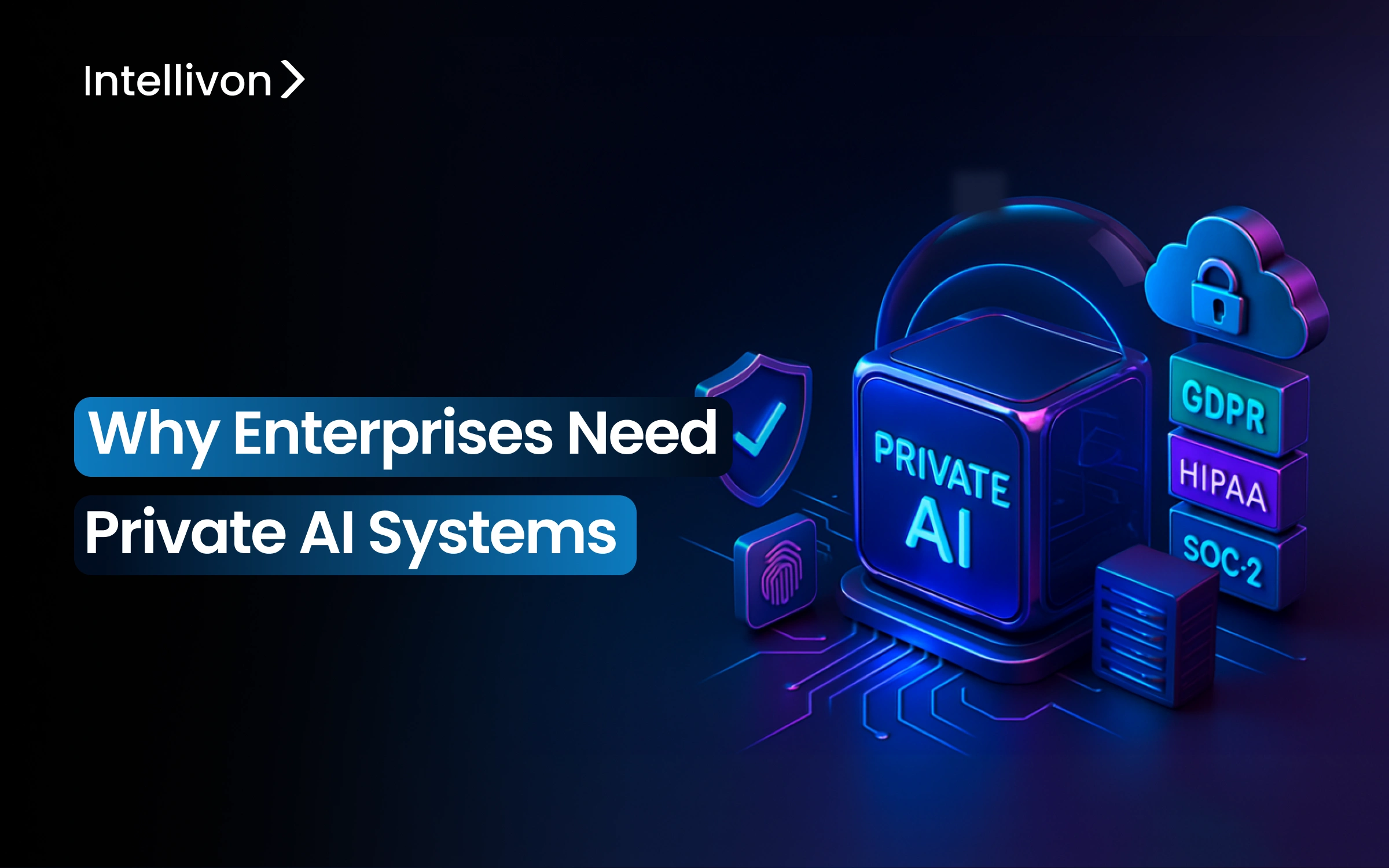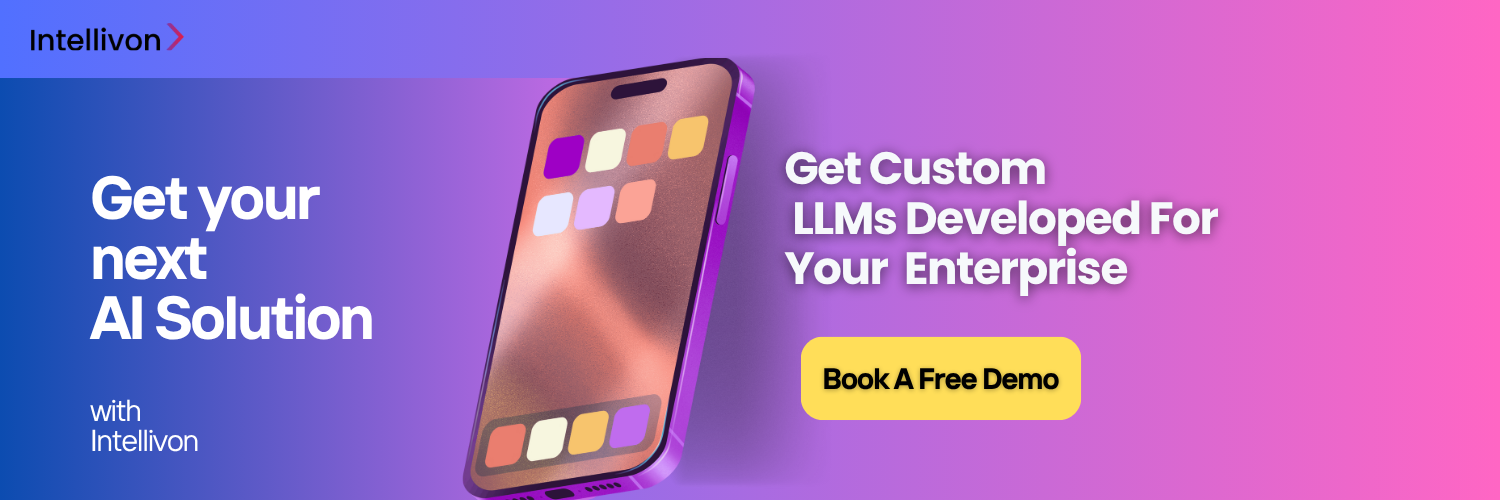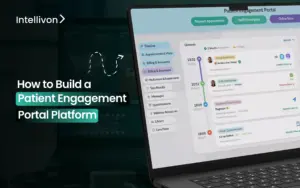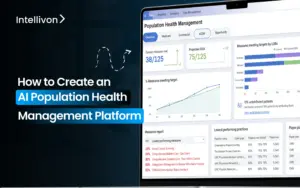What if your enterprise’s confidential data became the training data for your competitor’s AI? This is a very real risk in today’s business world. As AI grows more powerful, competitors can gain access to your data and quickly launch products or solutions based on it. The speed at which AI can process and learn from data means that the advantage you once had can vanish in the blink of an eye. About one-third (32%) of cyber incidents in 2024 involved data theft and leaks, solidifying the need for systems that can help you scale AI, yet keep it private and compliant.
Public AI solutions often put businesses at risk. They can expose sensitive information and make compliance harder. This is why enterprises need private AI systems that offer more control over their data. Around 60-70% of enterprises are now using or building private AI systems to ensure data privacy and maintain a competitive edge.
Intellivon specializes in designing scalable private AI systems for large enterprises, keeping security and compliance at its core. Our AI experts leverage our suite of cutting-edge tools dedicated to crafting 100% compliant and secure AI systems. We build and implement private AI systems specifically customized to fit your unique enterprise needs. Our solutions give you full control over your data while ensuring security, privacy, and compliance. In this blog, we walk you through why your enterprise needs these private AI systems and how we develop them from the ground up.
What is Private AI and Why Enterprises Need It
The global generative AI market was worth $25.86 billion in 2024 and is expected to grow to $1005.07 billion by 2034, with an annual growth rate of 44.20% from 2025 to 2034, according to Precedence Research.
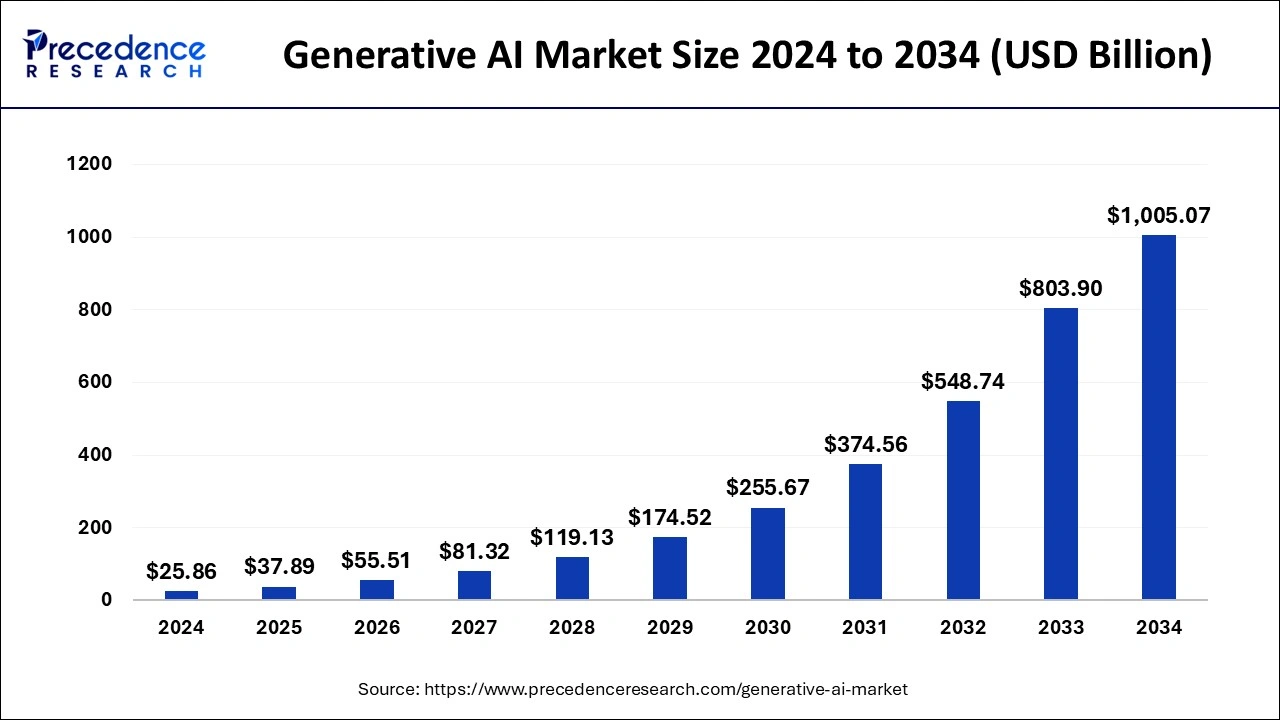
- Around 60-70% of businesses are adopting or building private AI systems to have better control over data privacy and security, and to stay competitive.
- Many companies are investing heavily in AI, with 88% of mid-to-large organizations spending more than 5% of their IT budgets on AI, particularly on private AI.
- North America is leading in private AI investments, with over $109 billion spent on private AI in 2024 alone.
What is Private AI?
Private AI refers to artificial intelligence systems that are designed and deployed within a private, secure environment, specifically for a single organization. Unlike public AI, which relies on cloud services and shared data, private AI ensures that the enterprise retains full control over its data. This means that sensitive business data never leaves the company’s secure infrastructure, minimizing risks associated with data exposure, security breaches, or misuse.
Private AI systems are custom-built to meet the specific needs of an enterprise. They can be tailored to work with the company’s existing infrastructure and data while providing the necessary level of security. This makes private AI a preferred choice for large organizations that deal with sensitive customer information, intellectual property, and proprietary business algorithms.
Private vs Public AI – Which is Better For Enterprises
When choosing an AI solution for your enterprise, it’s crucial to decide whether a private or public AI system is the best fit for your needs. While both have their advantages, understanding the key differences can help you make a more informed decision.
Private AI gives enterprises full control over their data, security, and AI models. It operates within the company’s secure infrastructure, ensuring that sensitive information stays protected. This level of control is especially important for businesses that handle proprietary data or must comply with strict data protection regulations.
Public AI, on the other hand, is hosted on third-party cloud services and often involves shared infrastructure. It offers convenience, cost-effectiveness, and scalability, but can expose enterprises to security risks and potential data misuse. Public AI is generally easier to implement but may not offer the level of customization or security that large organizations require.
Key Differences Between Private AI and Public AI
| Feature | Private AI | Public AI |
| Data Security | Full control over data, ensuring privacy and protection | Data may be stored and processed off-site, exposing it to security risks |
| Compliance | Easier to comply with strict regulations (GDPR, CCPA, etc.) | Compliance can be more difficult due to reliance on third-party services |
| Customization | Highly customizable to business needs | Limited customization options |
| Cost | Higher upfront cost for infrastructure and maintenance | Generally more affordable, with pay-as-you-go pricing models |
| Scalability | Scalable, but may require more resources to grow | Easily scalable due to cloud-based infrastructure |
| Implementation Time | Longer implementation, requiring more setup | Faster implementation with ready-to-use solutions |
In summary, private AI is often the better choice for enterprises that require complete control over their data, need to comply with regulations, or work with sensitive information.
Benefits of Private AI Systems for Large Enterprises
Private AI systems provide large enterprises with essential advantages, including enhanced security, full data control, tailored solutions, and scalability. These benefits help businesses protect sensitive information and drive operational efficiency.
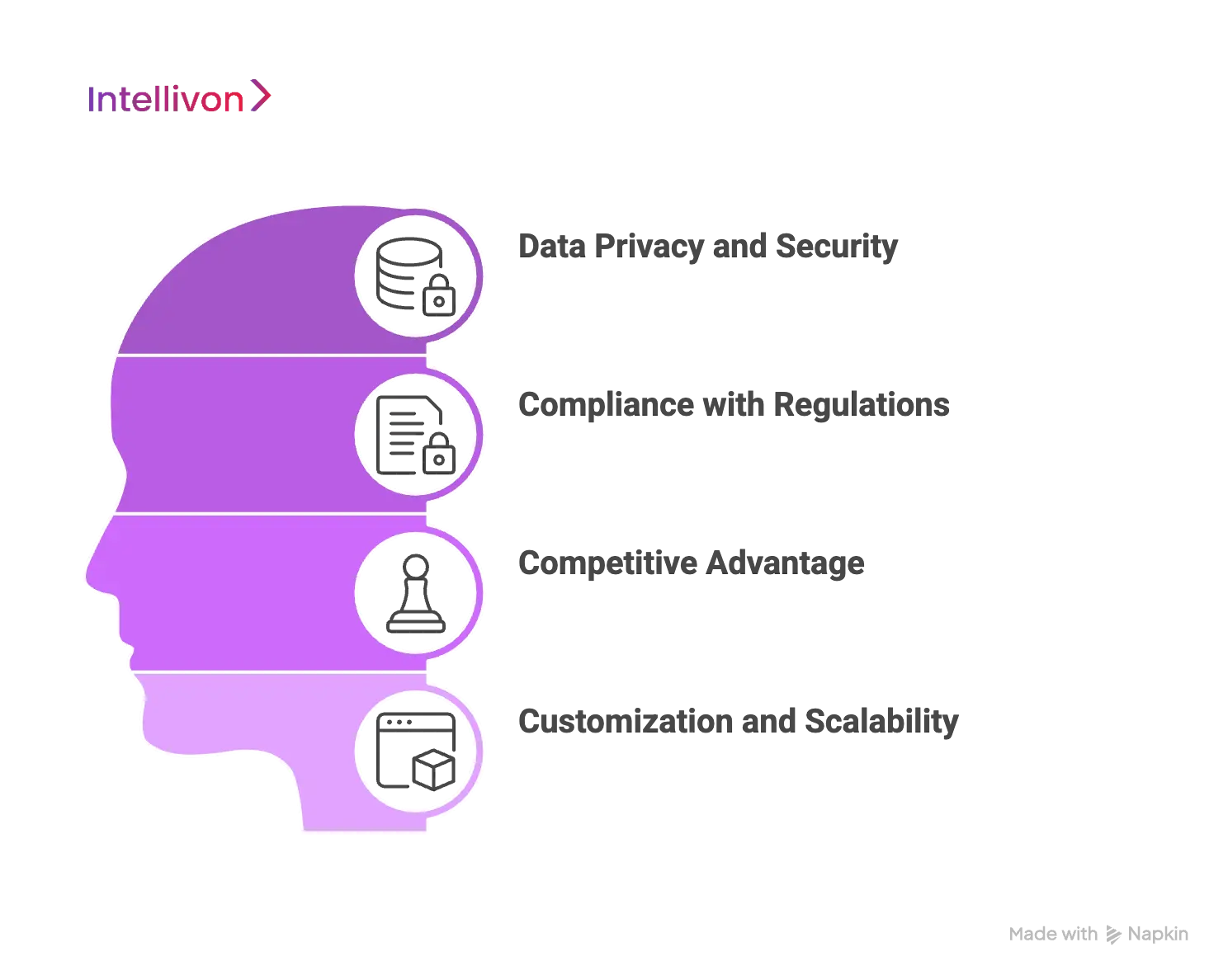
1. Data Privacy and Security
Private AI ensures that sensitive data, such as customer information or proprietary algorithms, stays within the organization’s controlled environment. By eliminating reliance on third-party cloud services, private AI reduces the risk of data leaks or breaches.
2. Compliance with Regulations
With growing concerns about data privacy, adhering to regulations is crucial. Private AI allows enterprises to fully control how data is stored, processed, and used, ensuring compliance with strict data protection laws.
3. Competitive Advantage
When data is securely housed within a private AI system, an enterprise can maintain a competitive edge by leveraging its unique data without risking exposure to competitors. Public AI solutions often use data from multiple sources, potentially giving competitors insights into an enterprise’s proprietary data.
4. Customization and Scalability
Private AI solutions can be tailored to an enterprise’s specific needs. Whether it’s adjusting AI models for unique business goals or scaling AI systems as the business grows, private AI systems provide the flexibility needed for long-term success.
By adopting private AI, enterprises can ensure their data is secure, their operations are compliant, and they can maintain their competitive edge in a world increasingly driven by artificial intelligence.
Top Industry Use Cases of Private AI in Enterprises
Private AI systems are revolutionizing industries by allowing businesses to securely leverage AI technology. Below are high-ticket use cases across six major industries, with real-world examples demonstrating how private AI is driving efficiency, innovation, and competitive advantage.
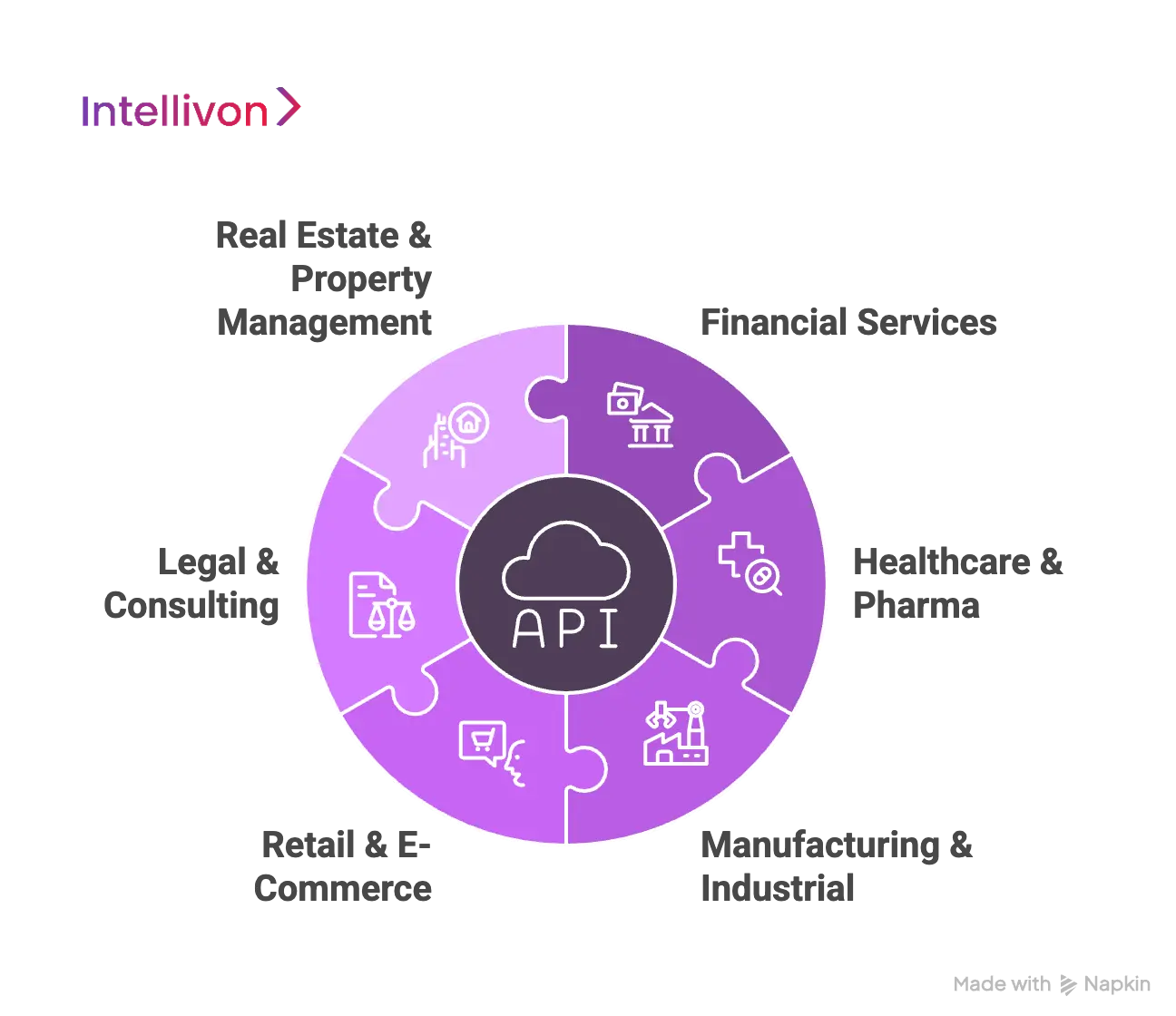
1. Financial Services
Private AI systems in the financial sector help detect fraud, ensure compliance, and enhance client services with secure, customized solutions. These systems ensure that sensitive financial data remains protected while automating complex processes.
- AI-Powered Fraud Detection and Risk Assessment
AI models built on synthetic data can identify fraudulent activities and assess risks in real-time, improving security and reducing financial loss. - AI Agents for Contract Drafting and Compliance
AI agents automate contract creation, risk scoring, and compliance checks, improving efficiency and reducing the chances of human error. - Personalized Banking Chatbots
AI-powered chatbots offer personalized banking services and automate routine tasks, enhancing customer experience and reducing operational costs.
Example:
JPMorgan Chase uses AI-powered fraud detection systems that analyze transaction patterns and identify suspicious activities in real-time, significantly enhancing security and reducing fraud risks.
2. Healthcare & Pharma
In healthcare, private AI is used to accelerate drug discovery, assist in medical decision-making, and streamline clinical processes. AI systems help healthcare providers offer more personalized care while maintaining strict data privacy standards.
- AI-Driven Drug Discovery
Private AI models simulate protein structures and predict drug interactions, speeding up drug discovery and ensuring precise medical interventions. - Medical Decision Support
AI analyzes patient data to provide doctors with actionable insights, improving decision-making, patient outcomes, and cost-effectiveness. - Automating Clinical Documentation AI assistants help automate clinical documentation and patient interaction management, freeing up healthcare professionals for direct patient care.
Example:
Mount Sinai Health System uses AI to analyze patient data and provide decision support to doctors, improving patient outcomes and reducing the overall cost of care.
3. Manufacturing & Industrial
Private AI in manufacturing enhances automation, predictive maintenance, and operational efficiency. AI systems analyze data from machines and production lines to optimize performance, reduce downtime, and improve product quality.
- Automated Quality Inspection
AI systems use computer vision to automatically inspect products and machinery on production lines, ensuring quality and reducing defects. - Predictive Maintenance
AI models predict when machines will require maintenance, preventing unexpected failures and minimizing downtime. - AI for Dynamic Pricing and Supply Chain Optimization AI optimizes pricing strategies and streamlines supply chains, ensuring the right products are available at the right time and price.
Example:
Tesla employs AI-powered computer vision to perform quality inspections on its production lines, ensuring each vehicle meets its strict quality standards while identifying areas for process improvement.
4. Retail & E-Commerce
Retailers leverage private AI for personalized marketing, dynamic pricing, and inventory management. These AI systems enable businesses to analyze customer behavior and trends to optimize sales strategies and improve the shopping experience.
- Product Catalog Enrichment
AI automates the process of updating and enriching product catalogs, speeding up time-to-market and ensuring accurate listings. - Personalized Marketing Campaigns AI creates highly targeted marketing campaigns, enhancing customer engagement and driving sales conversions.
- Dynamic Pricing and Customer Segmentation AI helps retailers implement dynamic pricing strategies and segment customers based on purchasing behaviors, maximizing revenue.
Example:
Sephora uses AI-driven personalized marketing campaigns, leveraging customer data to create targeted promotions and offers, significantly increasing customer engagement and sales conversion rates.
5. Legal & Consulting
Private AI in the legal and consulting sectors automates document review, contract analysis, and strategic recommendations. These systems save time and enhance accuracy, helping firms respond quickly and improve service delivery.
- AI Agents for Legal Document Review
AI tools assist legal teams by automating contract reviews, identifying risks, and suggesting operational improvements. - Document Processing and Case Research Automation
AI systems analyze legal documents and case data, providing quick insights that help streamline legal research and document drafting. - Consulting Project Efficiency
AI analyzes briefs and generates responses rapidly, allowing consultants to provide faster, more effective advice.
Example:
Baker McKenzie employs AI technology to automate contract reviews, enabling legal teams to identify risks, streamline workflows, and improve decision-making efficiency.
6. Real Estate & Property Management
In real estate, private AI enhances property search, client advisory, and tax assessment processes. AI systems allow real estate companies to analyze complex criteria and provide personalized insights for better decision-making.
- Intelligent Property Search and Analytics
AI analyzes property features and market conditions, helping real estate professionals and investors identify the best properties based on specific criteria. - Estate Planning and Client Advisory
AI tools automate estate planning and provide personalized recommendations for real estate investments, improving decision-making and client satisfaction. - Automating Tax Assessment and Audits
AI models streamline the tax assessment process, ensuring accuracy and reducing the time spent on audits and financial reporting.
Example:
Zillow uses AI to analyze property listings, market conditions, and buyer preferences, helping real estate professionals and investors find properties that meet specific investment goals and sustainability standards.
How Private AI Finds the Right Answers For Enterprises: The Power of RAG
Retrieval-Augmented Generation (RAG) is a powerful AI framework that enhances large language models LLMs by integrating external, trusted, and enterprise-specific data sources into the AI’s response generation process. Unlike traditional LLMs, which generate answers solely based on patterns learned during training, RAG supplements the model with real-time, relevant information retrieved from an enterprise’s own data repositories. These repositories can include documents, policies, product databases, and other knowledge bases.
This approach enables private AI systems in enterprises to deliver highly relevant, factual, and tailored responses. By grounding AI outputs in accurate, up-to-date internal data, RAG ensures that the answers are always aligned with the organization’s specific needs. The retrieval component identifies and supplies the most pertinent document sections or data chunks relevant to a user’s query, which the language model then uses to generate context-specific answers.
Key Benefits of RAG for Enterprises
- Enhanced Accuracy and Trust: RAG reduces AI hallucinations by constraining AI responses to verified enterprise data. This boosts user trust, ensuring the accuracy and reliability of the AI’s outputs.
- Personalized and Contextual Interactions: Enterprises can customize RAG-powered responses based on specific business rules, client data, or workflows. This leads to more personalized and contextual interactions, whether in customer-facing chatbots or internal knowledge tools.
- Control Over Data Privacy and Security: With RAG, the AI only accesses and uses data that the enterprise controls and authorizes. This ensures compliance with privacy and security regulations, keeping sensitive information protected.
- Efficient Use of Proprietary Data: RAG enables enterprises to leverage siloed and multi-format data (structured, semi-structured, unstructured). It indexes, chunks, and embeds content for fast retrieval, making the most of an organization’s proprietary data.
- Cost and Time Efficiency: Instead of costly retraining of large models whenever new data is available, RAG allows organizations to quickly update the knowledge base for their AI queries, keeping the system relevant with minimal overhead.
Intellivon’s RAG enhances private AI by integrating your enterprise’s internal data sources. This ensures responses are accurate and tailored to your needs. By pulling real-time, relevant information from proprietary documents and databases, our AI delivers context-specific insights. It maintains data privacy and security, reduces misinformation, and boosts decision-making. This approach ensures compliance with industry regulations, minimizes overhead, and maximizes efficiency
Key Capabilities of Our Private AI Systems for Your Enterprise Success
Our Private AI systems are purpose-built to provide secure, intelligent, and enterprise-ready capabilities tailored to your business needs. Designed around the pillars of Control, Accuracy, and Integration, they ensure you get the most from AI without compromising on privacy, compliance, or competitive edge.
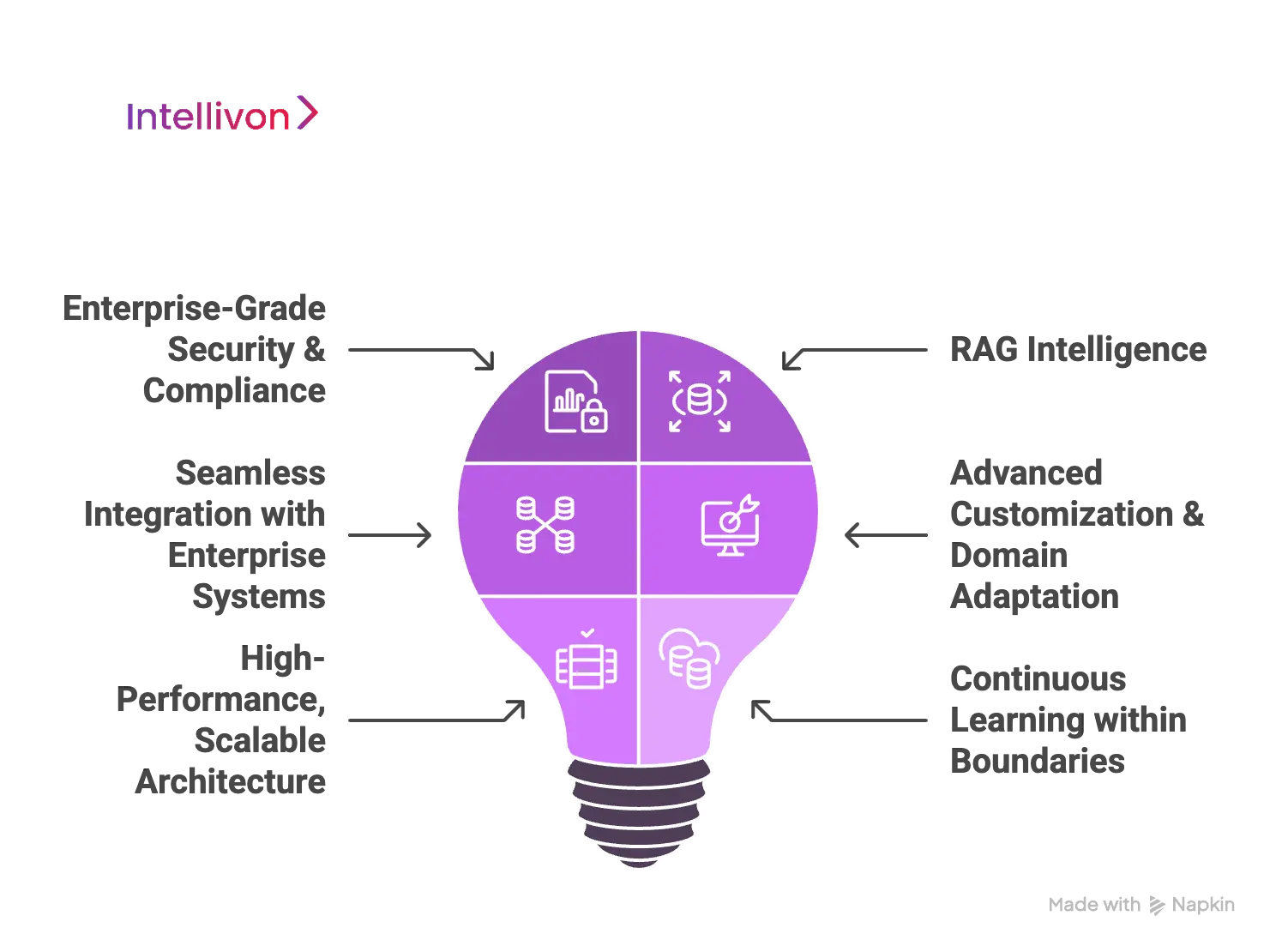
1. Enterprise-Grade Security & Compliance
- Data Sovereignty: With our private AI, all your data stays within your secure infrastructure, whether on-premise, in a private cloud, or a hybrid setup. This ensures you maintain complete control over data access, usage, and storage, with no risk of external exposure or compromise.
- Regulatory Alignment: Our AI systems are built to meet the highest regulatory standards, including GDPR, HIPAA, CCPA, ISO 27001, and other industry-specific compliance frameworks. This ensures your enterprise meets legal requirements while reducing the burden of managing compliance.
- Role-Based Access Controls (RBAC): Intellivon’s AI systems offer granular control through RBAC, allowing you to define precise permissions for users and systems. This ensures that only authorized personnel can access sensitive AI capabilities, giving you full oversight and control of your data.
2. RAG Intelligence
- Grounded in Your Data: Unlike traditional AI systems, RAG ensures that all AI-generated responses are grounded in your verified, enterprise-specific knowledge base. This enables your organization to access answers tailored to your unique data, ensuring relevance and accuracy in every interaction.
- Real-Time Updates: RAG allows for real-time updates to your AI systems without the need for costly retraining. As new data becomes available, it’s instantly accessible through dynamic retrieval pipelines, keeping your AI responses up-to-date and aligned with your current business needs.
- Reduced Hallucinations: By relying on your own proprietary data, RAG minimizes the occurrence of hallucinations, incorrect or fabricated information that can undermine trust in AI. Every AI response is backed by factual data, making it a reliable tool for decision-making and operational support.
3. Seamless Integration with Enterprise Systems
- Plug & Play APIs: Our AI systems come with easy-to-use plug-and-play APIs that integrate seamlessly with your existing enterprise systems, such as ERP, CRM, BI tools, intranets, and document management systems. This ensures smooth adoption with minimal disruption to your workflows.
- Multi-Format Knowledge Handling: Intellivon’s private AI can handle a wide range of data formats, including PDFs, spreadsheets, emails, databases, and application logs. This flexibility allows you to leverage all your business data for smarter AI-driven decisions.
- Cross-Departmental Use: Our AI is designed to support a wide range of workflows across departments, from HR query bots to predictive analytics in manufacturing. This versatility allows your enterprise to utilize AI throughout the organization, improving efficiency and collaboration across teams.
4. Advanced Customization & Domain Adaptation
- Business-Specific Fine-Tuning: Intellivon’s AI can be tailored to reflect your business’s specific needs. Whether you need to customize responses, adjust tone, or align logic with your operational style, our AI adapts to fit your brand and objectives, offering more relevant and accurate outputs.
- Private Knowledge Graphs: Our private knowledge graphs enable the linking of dispersed datasets across your enterprise. This deep semantic understanding of your data allows for smarter insights and more effective decision-making by connecting previously siloed information across different departments.
- Multi-Language Capability: Intellivon’s AI supports seamless communication across global markets and teams. Whether you’re operating in one region or several, our AI ensures that language barriers don’t impede your business operations, allowing for consistent and efficient communication at scale.
5. High-Performance, Scalable Architecture
- Elastic Compute: Our AI system is designed to scale up during periods of high demand without compromising on speed or accuracy. Elastic Compute ensures that your AI can handle fluctuating workloads, providing consistent performance even during peak times.
- Edge & Hybrid AI Options: For faster responses and lower latency, our AI can be run close to where data is generated, whether on the edge or in a hybrid cloud environment. This enables real-time data processing, offering quicker insights and better decision-making on the fly.
- Optimized for Cost Efficiency: Intellivon’s AI framework is built to maximize ROI by optimizing resource usage. Through intelligent AI architecture and cost-effective computing strategies, you get the most out of your investment without sacrificing performance or scalability.
6. Continuous Learning within Boundaries
- Feedback Loops: Our AI systems feature feedback loops that allow the system to continuously improve based on user interactions. These learning cycles help refine the AI’s responses, making it smarter and more accurate while adhering to privacy and governance rules.
- Event-Driven Updates: With event-driven updates, our AI can automatically incorporate new policies, pricing changes, or market data into its knowledge base. This ensures your AI remains aligned with your current business environment, without manual intervention.
- Human-in-the-Loop Controls: For high-stakes decision-making, our systems provide human-in-the-loop controls. This allows experts to oversee and validate AI outputs, ensuring that critical decisions are made with both human and AI intelligence working in tandem.
Core Pillars Behind Our Private AI Systems
- Security First: With enterprise-grade privacy, encryption, and compliance as standard, we ensure that your data remains protected, confidential, and compliant with industry regulations.
- Knowledge-Driven Accuracy: Our AI systems ground responses in your proprietary data and business rules, ensuring that every answer is accurate, relevant, and context-specific.
- Seamless Enterprise Integration: Intellivon’s AI integrates effortlessly with your existing systems, allowing you to leverage AI without disrupting your workflows or business processes.
- Scalable & Adaptive: Our AI is designed to grow with your business, adapting to changing needs and ensuring that your enterprise stays ahead of the curve without compromising performance.
These capabilities ensure that Intellivon’s Private AI systems provide a secure, scalable, and intelligent solution, enabling your enterprise to maximize the value of AI while maintaining control, privacy, and compliance.
Step-By-Step Process of How We Build Private AI Systems for Enterprises
At Intellivon, we tailor each AI solution to the unique requirements of large enterprises. Our approach ensures that the AI system is secure, scalable, and perfectly aligned with your business goals. Here’s how we build a private AI system that works seamlessly for your enterprise:
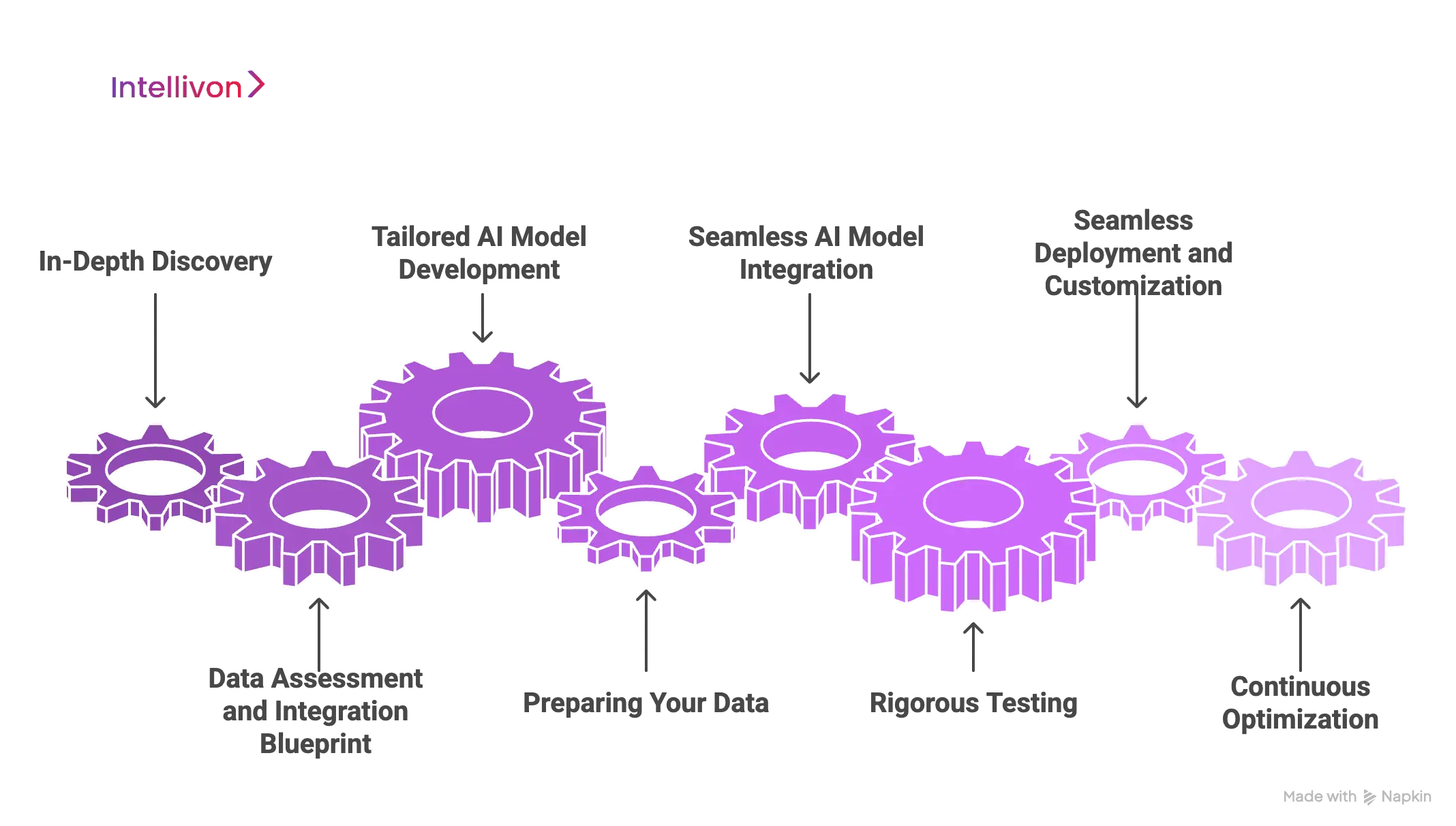
1. In-Depth Discovery
We begin by working closely with your team to understand the specific business challenges and goals you’re aiming to address with AI.
This discovery phase helps us gain insight into your data, workflows, and desired outcomes, allowing us to define a clear roadmap and ensure the AI solution is aligned with your enterprise objectives.
2. Data Assessment and Integration Blueprint
The next step involves assessing your current data landscape, whether it’s structured or unstructured, and creating a comprehensive integration plan.
We evaluate your databases, document management systems, and APIs, identifying how the AI system will securely access and process this data while ensuring compliance with privacy regulations such as GDPR and HIPAA.
3. Tailored AI Model Development
Once we understand your data and goals, </span>we develop a custom AI model suited to your specific use cases.
Using the latest ML techniques and RAG, we design models that are capable of delivering highly relevant, accurate, and context-specific responses based on your proprietary business data.
4. Preparing Your Data
Data preparation is a critical step in ensuring that your AI system works efficiently. We clean, structure, and preprocess your data, indexing, chunking, and embedding it for optimal retrieval.
This ensures that your AI can access the right information quickly and that your proprietary data remains secure throughout the process.
5. Seamless AI Model Integration
In this phase, we begin building the AI system and integrating it with your existing enterprise systems, such as CRM, ERP, and business intelligence tools.
Using custom APIs, we ensure that the AI can easily connect with your infrastructure and access your proprietary knowledge base in real time, enabling smoother workflows and operations.
6. Rigorous Testing
We conduct extensive testing to ensure the AI system meets your performance, accuracy, and security requirements.
This includes testing the system with real-world data to verify that it delivers accurate, actionable insights based on your enterprise’s specific knowledge and that it adheres to data privacy and security standards.
7. Seamless Deployment and Customization
After testing, we deploy the AI system within your environment, working closely with your IT and operations teams to ensure smooth integration with minimal disruption.
We also fine-tune the AI’s responses, tone, and logic to align with your brand and business processes, ensuring that the solution meets the unique demands of your enterprise.
8. Continuous Optimization
Post-deployment, we focus on ongoing monitoring and optimization. We track the AI’s performance, gather user feedback, and make necessary adjustments to improve accuracy and efficiency.
This step ensures that the system evolves with your business and continues to meet your objectives as your needs change.
This step-by-step process ensures that Intellivon’s private AI systems are custom-built to suit the specific needs of your enterprise, from data assessment to deployment and beyond. With a strong focus on security, scalability, and continuous improvement, we ensure that your AI solution provides long-term value while maintaining the highest standards of compliance and privacy. Contact our AI Consultants today. Cost of Building Private AI Systems for Enterprises.
Tools and Techniques We Use to Make AI Systems Compliant and Scalable for Enterprises
At Intellivon, we focus on building AI systems that are secure, scalable, and compliant with industry standards. Our solutions ensure that your AI system can grow with your enterprise while maintaining strict privacy controls and regulatory compliance. Below are the tools and techniques we use to achieve this balance.
1. Advanced Data Encryption and Privacy Protocols
To ensure your enterprise data remains protected, we implement the following tools and techniques for encryption and privacy:
- AES-256 Encryption: This industry-standard encryption method ensures that your data remains secure both at rest and in transit, protecting it from unauthorized access.
- TLS/SSL Protocols: We use Transport Layer Security (TLS) and Secure Sockets Layer (SSL) protocols to safeguard data as it travels between systems, ensuring data confidentiality and integrity during transfers.
- Tokenization: For sensitive data, we use tokenization techniques to replace sensitive information with non-sensitive placeholders, further securing data access while preserving its utility for processing.
- GDPR/CCPA Privacy Frameworks: We implement frameworks that automatically anonymize or pseudonymize personal data, ensuring full compliance with data protection laws such as GDPR and CCPA.
2. Role-Based Access Control (RBAC) and Identity Management
To manage access to your AI system and data, we use:
- Okta and Auth0: These tools enable secure identity management and Single Sign-On (SSO) capabilities across your enterprise systems. They ensure that only authorized personnel have access to specific AI functionalities.
- RBAC (Role-Based Access Control): We implement RBAC to define granular permissions. Using tools like Azure Active Directory and AWS Identity and Access Management (IAM), we ensure that each user has the appropriate level of access to sensitive AI systems and data based on their role within the organization.
- Multi-Factor Authentication (MFA): For an additional layer of security, we integrate MFA into your AI system, ensuring that all access attempts are verified through multiple methods (e.g., biometrics, SMS verification).
3. Automated Compliance Audits and Reporting Tools
To automate the monitoring and reporting of compliance, we use the following tools:
- Vanta and Drata: These platforms continuously monitor your AI system’s compliance with key regulations such as GDPR, HIPAA, and ISO 27001, generating automated reports and alerts when discrepancies are detected.
- AuditBoard: We use AuditBoard to streamline internal audits and ensure your AI system meets compliance standards. The platform automates audit tasks, making it easier to track and report on compliance metrics in real-time.
4. Seamless Integration with Legacy Systems
Integrating AI systems into your existing infrastructure is crucial for smooth deployment. We use tools and techniques to ensure seamless integration:
- MuleSoft and Apache Camel: These integration platforms allow us to connect AI systems to legacy applications such as ERP, CRM, and financial management systems, ensuring smooth data exchange between the new AI system and your existing systems.
- ETL Tools (Extract, Transform, Load): Using tools like Talend and Informatica, we enable efficient data extraction, transformation, and loading into the AI system, ensuring seamless integration with legacy databases and applications.
- API Gateways (AWS API Gateway, Apigee): These help facilitate communication between legacy systems and AI models, allowing for easy and secure access to business-critical data from older applications.
5. Scalable Cloud Infrastructure with Auto-Scaling
To ensure your AI system can scale as needed, we leverage the following cloud infrastructure tools:
- AWS Auto Scaling and Google Cloud Auto-Scaling: These cloud-native tools automatically adjust the resources used by your AI system based on real-time demand, ensuring the system can scale up during high-demand periods without sacrificing performance.
- Kubernetes: We use Kubernetes for container orchestration, allowing us to deploy, manage, and scale AI models across different environments, ensuring high availability and flexibility.
- Cloud Load Balancers (AWS ELB, Azure Load Balancer): These tools distribute incoming traffic across multiple servers, ensuring optimal resource utilization and uninterrupted service as demand increases.
6. Privacy by Design and Secure Data Access APIs
For secure and compliant data access, we implement the following tools:
- OAuth 2.0: This open standard for token-based authentication ensures that only authorized applications and users can access the AI system’s resources.
- API Security Tools (Auth0, Okta, Kong): We implement robust security measures for API interactions, ensuring secure and compliant data exchange between the AI system and third-party applications.
- Data Loss Prevention (DLP): Tools like Symantec DLP and Forcepoint help detect and prevent the unauthorized movement or sharing of sensitive data, ensuring compliance with privacy regulations.
7. Context-Aware Generation with RAG
To ensure that AI-generated content is relevant and accurate, we integrate RAG for context-aware generation. Key tools and techniques include:
- Elasticsearch and Apache Solr: These powerful search and indexing tools allow us to retrieve the most relevant data chunks from your knowledge base in real-time, ensuring that AI-generated responses are grounded in accurate and up-to-date information.
- GPT-3 or GPT-4 with Fine-Tuning: We use advanced language models like GPT-3 or GPT-4, which are fine-tuned to your enterprise-specific data using RAG. This ensures the AI generates responses that are contextually relevant and based on verified knowledge from your data repositories.
8. Continuous Monitoring and Real-Time Alerts
Continuous monitoring is essential to ensure ongoing compliance, security, and performance. We use:
- Prometheus and Grafana: These tools help monitor system health, performance, and security in real time. They provide dashboards and alerts, enabling proactive responses to any potential issues.
- Splunk and Datadog: These platforms offer real-time monitoring and log management, allowing us to track AI system activity, identify anomalies, and resolve issues before they affect performance.
9. High-Availability and Distributed Systems
To ensure maximum uptime and resilience, we implement the following tools:
- Apache Kafka and RabbitMQ: These distributed messaging systems allow for real-time data flow between your AI system and other enterprise applications, ensuring high availability and fault tolerance.
- Multi-Region Deployment: By deploying across multiple cloud regions, we ensure that your AI system remains operational even if one region experiences an outage, guaranteeing business continuity.
By utilizing these tools and techniques, Intellivon ensures that your AI system is secure, compliant, scalable, and ready to meet the needs of your enterprise today and in the future.
How We Overcome Common Barriers to Implementing Private AI in Enterprises
Implementing private AI in enterprises often presents several challenges, like complex infrastructure, scalability concerns, lack of AI expertise, security risks, costly deployments, and difficulties integrating with legacy systems. At Intellivon, we tackle these barriers head-on with a comprehensive and pragmatic approach, ensuring smooth AI adoption while protecting proprietary data and maximizing business value.
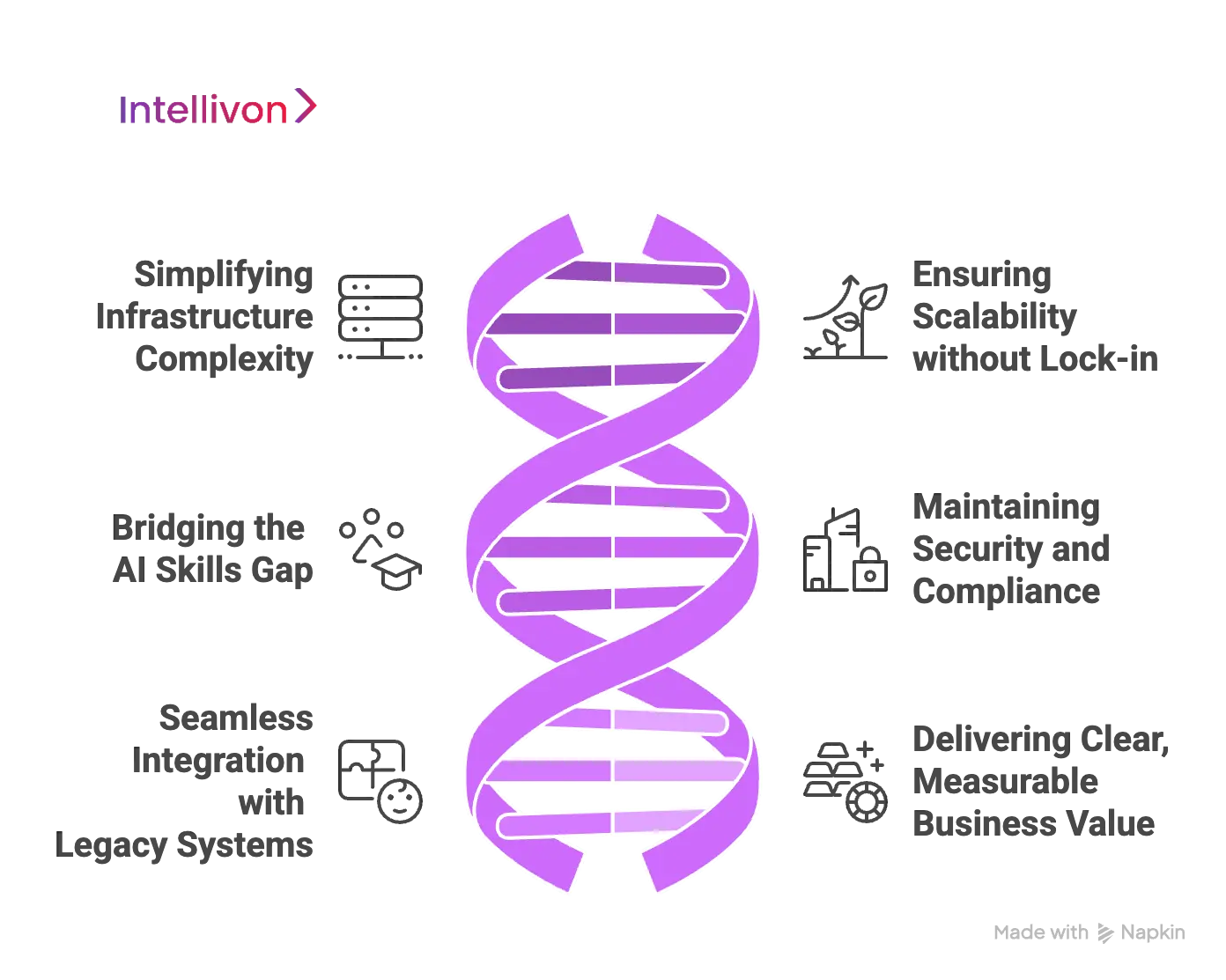
1. Simplifying Infrastructure Complexity
AI systems can be difficult to deploy due to complex infrastructure. We simplify this by using modular, microservices-based AI architectures, which break down the system into manageable components. Key components like data ingestion, model serving, and retrieval are decoupled, making deployment more flexible and scalable.
Our Solution:
- Hybrid Deployment Support: Our systems can be deployed on-premise, in a private cloud, or at the edge, providing flexibility to meet diverse enterprise IT needs and regulatory requirements.
- Automation with Kubernetes & Docker: Using Kubernetes and Docker for containerization and orchestration automates scaling and maintenance, reducing manual overhead and minimizing risk.
2. Ensuring Scalability without Lock-in
Scalability can be a concern when enterprises deploy private AI solutions. We ensure scalability by designing AI solutions with elastic infrastructure that automatically adjusts compute resources based on workload demands.
Our Solution:
- Unified Storage Layers: We replace multiple specialized storage systems with a unified storage layer, simplifying operations, reducing costs, and supporting AI training and inference at scale.
- Avoiding Hardware Lock-in: Our solutions do not rely on proprietary hardware. We support widely available GPU and CPU configurations, allowing your enterprise to stay flexible and leverage new hardware technologies without being tied to a specific vendor.
3. Bridging the AI Skills Gap
AI expertise is in short supply, making it difficult for enterprises to build and maintain AI systems. To bridge this gap, we offer turnkey platforms with streamlined user interfaces, automated workflows, and built-in best practices, making AI more accessible for internal teams.
Our Solution:
- Comprehensive Training & Support: We provide in-depth training, documentation, and ongoing support to empower your workforce and help them build AI operations capabilities in-house.
- Consulting and Managed Services: For specialized needs, we offer consulting services on model tuning, security compliance, and lifecycle management, ensuring your AI system is always operating at its best.
4. Maintaining Security and Compliance
Security and compliance are top priorities in enterprise AI deployments. Our systems feature role-based access control (RBAC), end-to-end encryption, and continuous compliance monitoring to ensure data protection and regulatory alignment with standards like GDPR, HIPAA, and CCPA.
Our Solution:
- Privacy-Preserving Technologies: We use technologies like federated learning and differential privacy to ensure that proprietary and sensitive data remain secure within your enterprise boundaries.
- Audit Trails and Alerts: Real-time audit trails and alerting systems<span style=”font-weight: 400;”> ensure quick responses to potential breaches or policy violations, maintaining the integrity and trust of your AI system.
5. Seamless Integration with Legacy Systems
Integrating AI with legacy systems can be challenging, but we use an API-first design to create flexible connectors and middleware that securely link AI modules to your existing systems like ERP, CRM, and document management tools—without modifying source data.
Our Solution:
- Non-Intrusive Knowledge Extraction: We work off indexed copies or metadata of legacy databases, ensuring that data integrity is preserved and business continuity is maintained.
- Event-Driven Synchronization: AI insights update in near real-time alongside enterprise workflows, ensuring smooth operation without disrupting existing systems.
6. Delivering Clear, Measurable Business Value
To prove the value of private AI, we prioritize quick deployment of business-aligned AI use cases that deliver tangible ROI. Whether it’s <b>fraud detection, compliance automation, or customer service augmentation, we focus on delivering immediate benefits.
Our Solution:
- Ongoing Model Refinement: We continuously refine AI models based on feedback loops, ensuring that outputs remain accurate, relevant, and aligned with evolving enterprise goals.
By addressing common barriers like infrastructure complexity, scalability, AI skills gaps, security concerns, and integration challenges, we empower enterprises to unlock the full potential of private AI.
Conclusion
Enterprises need private AI systems for key reasons: ensuring data security by keeping sensitive information within their control, offering customization to meet specific business needs, providing control over data access and AI processes, and enabling scalability to adapt to growing demands.
Private AI empowers organizations to unlock the full potential of AI technology while safeguarding their proprietary data and maintaining regulatory compliance.
Build Your Enterprise-Grade Private AI System With Intellivon
At Intellivon, we are dedicated to helping enterprises harness the full potential of private AI through seamless integration, robust security, and unmatched scalability. Our approach includes:
- Customizing AI for your unique needs: We design AI systems tailored specifically to your business requirements, ensuring alignment with your objectives and workflows.
- Providing seamless integration: Our AI solutions easily integrate with your existing systems, minimizing disruption and maximizing efficiency.
- Ensuring data security and compliance: We implement state-of-the-art security features and maintain continuous compliance with industry regulations to protect your data.
- Enabling future-proof scalability: Our AI systems are designed to grow with your business, adapting to changing demands while maintaining top-tier performance.
Ready to take the next step in empowering your enterprise with private AI? Contact us today to learn how Intellivon can help you unlock the power of secure, scalable, and customizable AI solutions.
FAQ’s
1. What are the benefits of private AI for enterprises?
Private AI offers numerous benefits for enterprises, including enhanced data security, customization to meet specific business needs, full control over data and AI processes, and scalability to support business growth. It ensures that sensitive data remains within the organization, reducing security risks while offering tailored solutions for better decision-making and operational efficiency.
2. How does private AI ensure compliance with regulations?
Private AI ensures compliance through built-in features such as role-based access controls (RBAC), data encryption, and continuous compliance monitoring. These features help businesses adhere to regulations like GDPR, HIPAA, and CCPA while maintaining the privacy and security of sensitive data, reducing the risk of legal issues and penalties.
3. How can private AI integrate with existing enterprise systems?
Private AI integrates seamlessly with existing enterprise systems through API-first designs and middleware. By using flexible connectors, we ensure secure and non-intrusive integration with systems like ERP, CRM, and document management, without disrupting the existing data flow or business operations.
4. Is private AI scalable for large enterprises?
Yes, private AI is highly scalable for large enterprises. With elastic cloud infrastructure, auto-scaling capabilities, and distributed systems, private AI can handle increasing workloads and adapt to growing data needs without compromising performance or efficiency, ensuring it can evolve as your business expands.
5. What are the main challenges when implementing private AI in enterprises?
Key challenges in implementing private AI include infrastructure complexity, scalability issues, AI expertise gaps, and legacy system integration. However, these challenges are addressed through modular AI architectures, automated workflows, training programs, and secure integration practices that ensure smooth adoption and deployment while maintaining compliance and data security.

